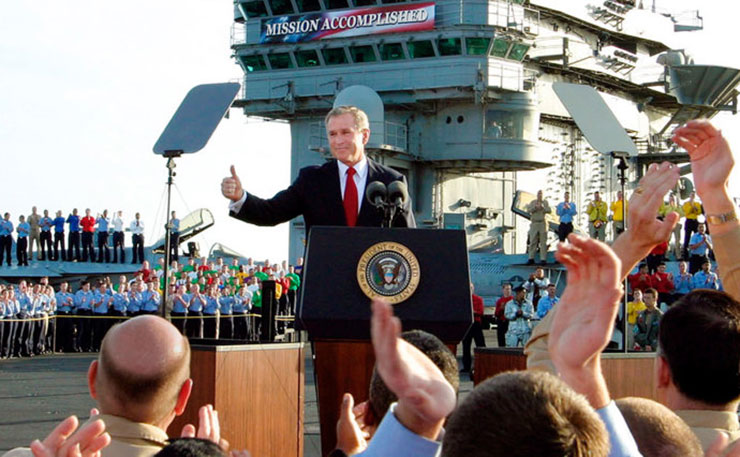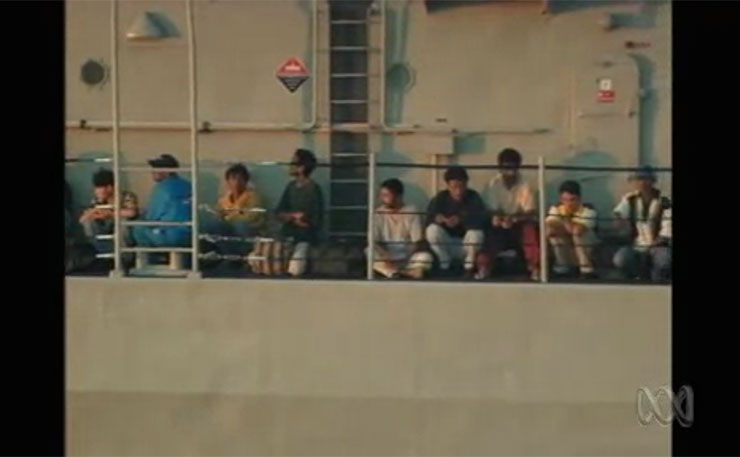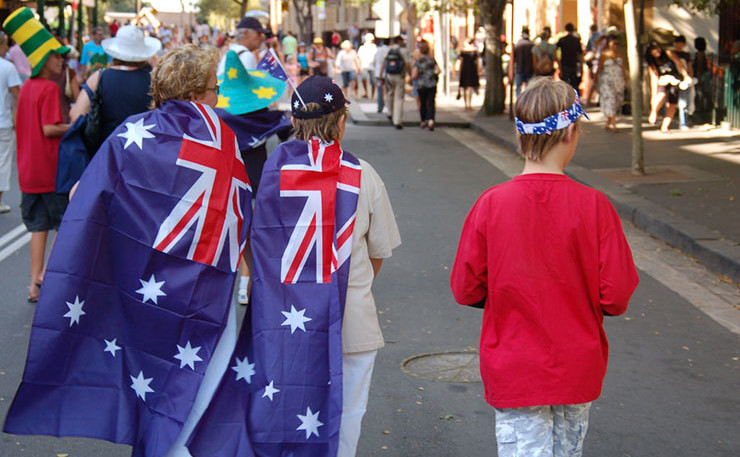What’s it like to feel like a foreigner in the land where you live? Rutaban Yameen explains.
James was a pasty boy with freckles and short brown hair. He stamped on my toes while we were lining up for class. His cheeks were flush from playing handball in the heat and humidity of the sticky Brisbane summer.
“I believe your uncle’s name is Osama, isn’t it?” I was cut. Then he said, “You’re related to Al-Qaeda aren’t you?” I pictured his parents talking about the threat of Muslims to Western civilisation, maybe over peas and mash. Or brussels sprouts.
It started with September 11
I was 10 years old when the September 11 attacks became the defining event of our generation. A new era in foreign policy and domestic surveillance was marked by the terrifying collapse of the Twin Towers in New York and the calculated destruction of the Pentagon in Washington DC.
My dad would switch on the news every evening. Few sources mentioned the 30 Muslim Americans among the victims.
The 24-hour news cycle was relentless. The Arab names and bearded faces of the 19 Al-Qaeda affiliated hijackers were read out and replayed. Most of them were citizens of the US-backed repressive Gulf state, Saudi Arabia. But news anchors didn’t mention that. Instead we were reminded to fear anyone who looked Arab.
Imams fell over themselves to assure all that Islam was a religion of peace. Meanwhile pigs’ heads were placed inside mosques and ‘terrorist’ was spray-painted on compound walls. Everyday we watched tearful Americans commemorate 2,996 innocent victims with flowers, plaques and photos.

In their name and under the amorphous concept of democracy, a pliant press gave voice to the Bush-Cheney-Rumsfeld neoconservative mantra that Muslims hated their freedom and were a threat to Western civilisation.
The US would root out Islamic terrorism by terrorising the peoples of sovereign nations.
The UK, Canada and Australia, under the thumb of right wing leadership, salivated over the spoils of war. They formed part of the ‘Coalition of the Willing’.
Operation Enduring Freedom was launched in Afghanistan on October 7, 2001. The ‘Shock and Awe’ bombing campaign in Iraq commenced March 20, 2003.
The Watson Institute reported that some 31,000 Afghan civilians had been killed as of August 2016. Huffington Post reported in 2013 that half a million Iraqi civilians had been killed since the US invasion. Their deaths were in vain.
Terrorism remains a frightening reality. The Barcelona, London, Nice, Paris and Boston attacks are permanently etched into public consciousness. Meanwhile Anders Breivik, who killed 77 people in Norway in 2011 to defend Europe from cultural Marxism and Islamic radicalism, would plead insanity in court. Breivik cited former Prime Minister John Howard as one of his intellectual influences.
I reported James’ remarks to my mum. She said, “Why did you have to tell everyone you’re Muslim? You should be more discreet.” My victimhood became my own fault. And 1.6 billion Muslims were pinned for every act of violence perpetrated by lone men with Arab names.
The more politicians, news anchors and radio hosts talked about banning the burqa, saving Afghan women with bombing raids and detaining refugees on far flung islands, the more I felt alien to this country.
Census data from 2016 reported Muslims constitute only 2.6 per cent of Australia’s population. Some 26 per cent of Australians are born overseas. But that’s one too many people of colour.
High on forging White nationhood
Australia’s birth is mired in the dispossession of Aboriginal people. So this country is addicted to forging White nationhood and scapegoating minorities. From the 1901 White Australia policy to today’s English language citizenship tests, immigrants face onerous obstacles to equal protection under the law.
I grew up with Howard’s prime-ministership from the age of 6 to the age of 17. His words shaped my relationship with Australia. At the Liberal National Party electoral campaign launch in 2001, he said national security is “about a proper response to terrorism”. He cited defence and border protection as part of that equation.
And then Howard added: “We will decide who comes to this country and the circumstances in which they come.”

The Howard Government intercepted some 438 asylum seekers attempting to enter Australian waters. Many Afghans, including Hazaras, were fleeing war and ethnic persecution. With bipartisan support from the Australian Labor Party, then Immigration Minister Philip Ruddock implemented the Pacific Solution. It denied asylum seekers arriving by boat legal access to the Australian mainland, instead providing mandatory detention on Christmas Island, Manus Island and Nauru.
Howard congratulated Ruddock on a “fantastic job”.
In recent years, Education Minister Christopher Pyne criticised the national curriculum for not selling “the benefits of Western civilisation in our society”. Kevin Donnelly was one of two conservative education commentators leading the national curriculum review. He said the curriculum undervalued “the significance of Judeo-Christian values to our institutions and way of life”. Donnelly had previously attacked the curriculum for “uncritically promoting diversity”.
In Howard’s final year as Prime Minister, he praised Australia for refraining “from being too obsessed with diversity”.
Balancing being Brown and “normal”
Australian values are characterised by an allergy to people of colour. My socialisation was mired in a stressful see-sawing act between embracing my Bangladeshi-Muslim roots and being “normal”.
I grew up without extended family and without friends from within a small Bangladeshi community. I was raised in majority White middle-class neighbourhoods and schools. My foreignness was fortified. I was asked by classmates, their parents, teachers and co-workers, “But where are you really from?”
Census data in 2011 revealed that 75 per cent of Australians identified with an ancestry other than Australian. But most would be confused if I ask them, “Where are you really from?”
My name was the subject of floored confusion. Its appearance in plain English on official documents was insufficient for correct pronunciation. Teachers misplaced syllables and would call me“Ru-ba-tan”. Students would transpose it to “Orang-utan”. I was likened to a monkey. This was reminiscent of the physical and intellectual inferiority attributed to Indian, African and Arab peoples by orientalist scholars rationalising British and French imperialism in the “darker” nations.
Australian comedian Aamer Rahman, himself of Bangladeshi descent, performed a satirical act in 2010 called, “Workshops for Whitey”. His first workshop was called, “don’t compliment me on my English”. To raucous laughter he said, “You’ll be talking to a White person and half-way through your first sentence, they will feel the need to cut you off to say something like, ‘Oh! Your English is fantastic!’” The repeated comments from my parents’ colleagues that my English was “beautiful” and that I spoke “like an Australian” were tiresome. “You talk like us!” they said.
I was educated in Australia. All my friends were Australian. My mum completed her PhD at Melbourne University. My dad completed his Bachelors at Deakin University. My paternal grandmother taught English in Bangladesh and her husband was a civil engineer who wrote English poetry in his downtime. So yeah, my English was fantastic.
Bombarded by images of White women who were actresses, models, singers and news anchors, I despised my frizzy dark hair. It refused to keep straight and was the subject of ridicule at school. I thought I was unattractive without lighter eyes and lighter hair. During high school, I would thin out my thick eyebrows with a pair of tweezers. I was deeply self-conscious until my mid-20s.
During university I worked in retail fashion. My manager would call me by the names of other women workers with South Asian heritage and vice versa. We were often told, “But you all look so alike”, to which we would reply, “No we don’t.” Our frustration was palpable.
Meanwhile, the customers I assisted would pet my arm and say, “Oh I love your skin colour, it’s so beautiful.” There is nothing more awkward than a total stranger touching you in your workplace without your permission and expecting you to thank them for it.
My peers at law school and my professional colleagues would ask whether I was Spanish, Peruvian, Iranian or Latina. I became an exotic other, especially to romantic interests. When I said my heritage was Bangladeshi, they would say, “But you don’t look Bangladeshi.”
Bangladesh has a population of 170 million. Its history is enmeshed with an India preceding borders. My heritage is the product of syncretism and diversity in language, culture, religion and ethnicity. My physical appearance cannot be confined to a single stereotype or false perception of what a particular people may generally look like. Political nationhood cannot determine the parameters of identity.
But it is often made to. And Australia does it well.
Migration woes
I have never felt at home in Australia. I wondered what the counterweight to this could have been.
A couple of months ago, I was in Toronto celebrating my cousin’s marriage to her Guyanese-Christian partner. I sat with the maid of honour, my cousin’s older sister. We were sipping lal chai.
She said, “All I wanted to be was a regular Jane growing up”. I was stunned. I said, “I always wondered why my name couldn’t just be Amy”. Our experiences of exclusion were strikingly similar. We had both internalised a self-disrespect in response to the pervasive nature of racism and identity in Canada and Australia. But she had the benefit of being surrounded by her paternal cousins and friends within a much larger and integrated Bangladeshi community.
For me, growing up in Canada or with more family in Australia may have cushioned the acute isolation I experienced here.
But this is the nature of migration, flight and being part of a diaspora. The economic and humanitarian realities facing immigrants and refugees together with the fortification of borders in the name of national security, is linked to the political construction of a singular, confining identity.
We may continue to see whole families and communities suffer fragmentation and isolation.
So where is home? I may never find it.
Donate To New Matilda
New Matilda is a small, independent media outlet. We survive through reader contributions, and never losing a lawsuit. If you got something from this article, giving something back helps us to continue speaking truth to power. Every little bit counts.






